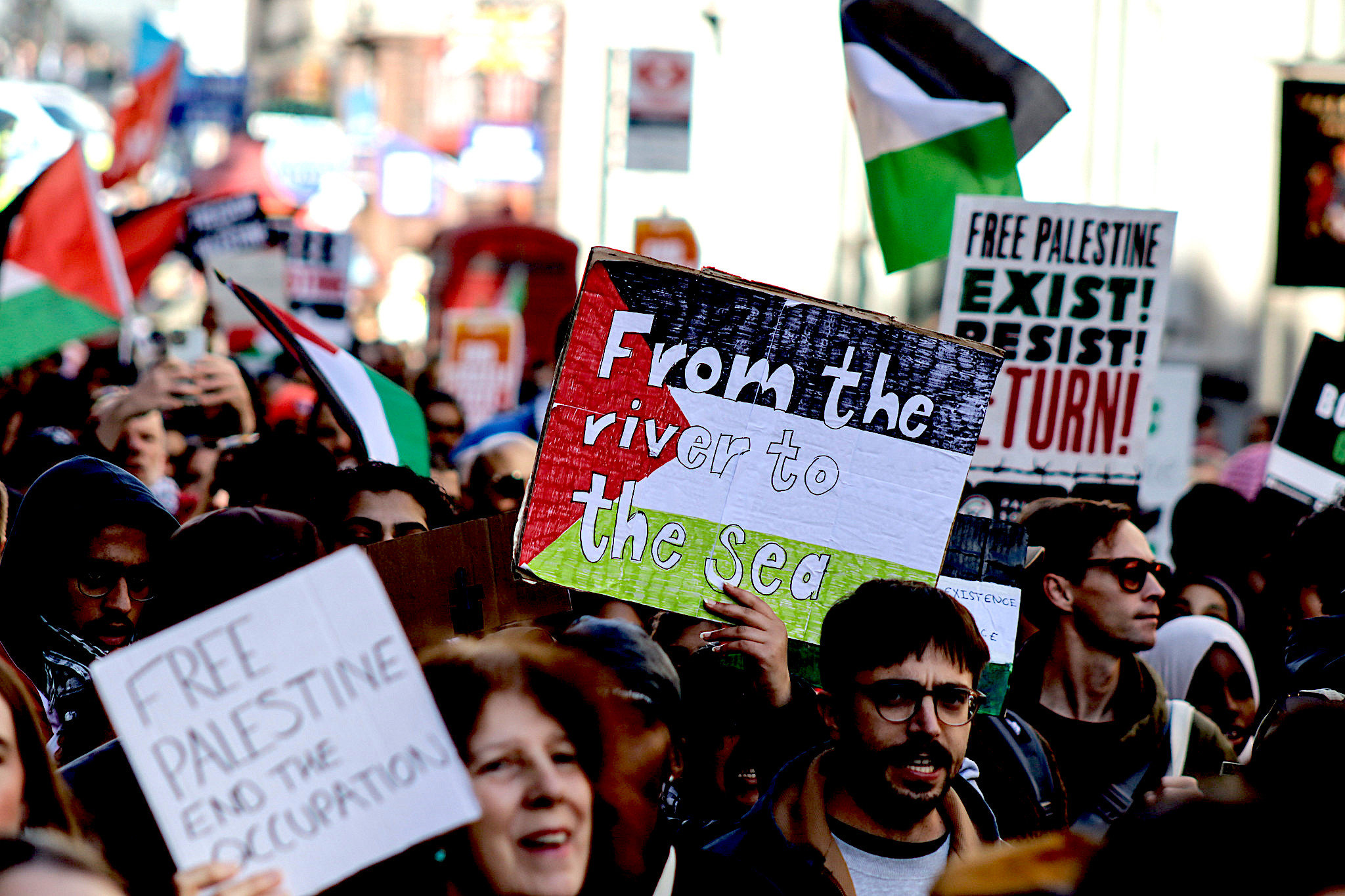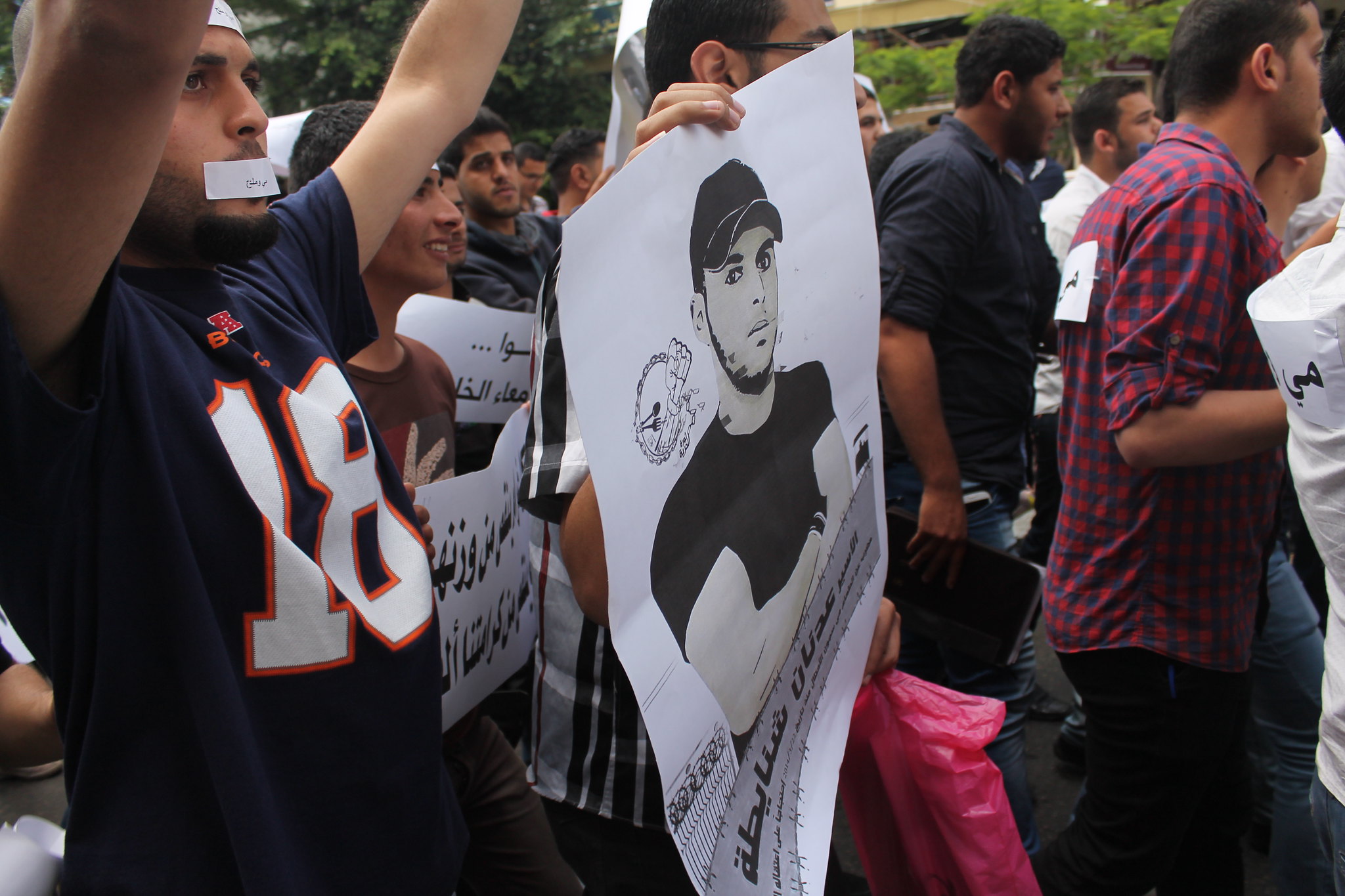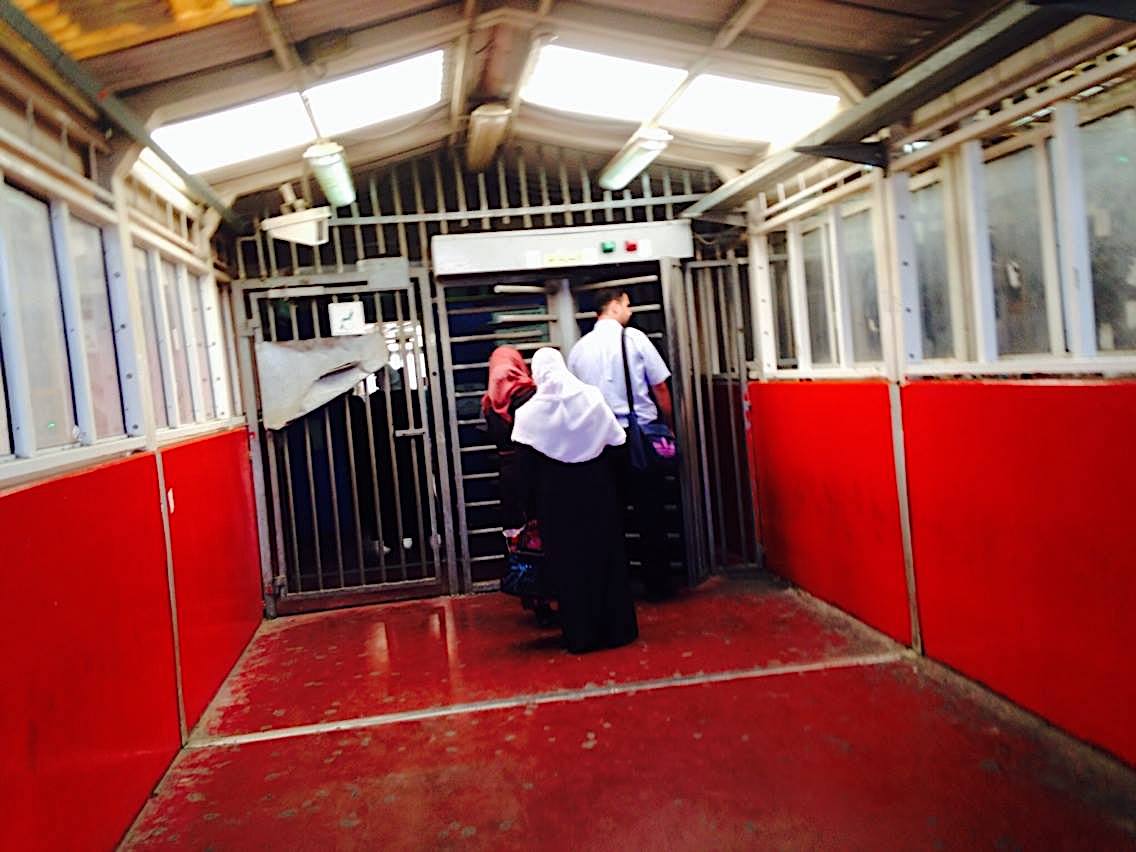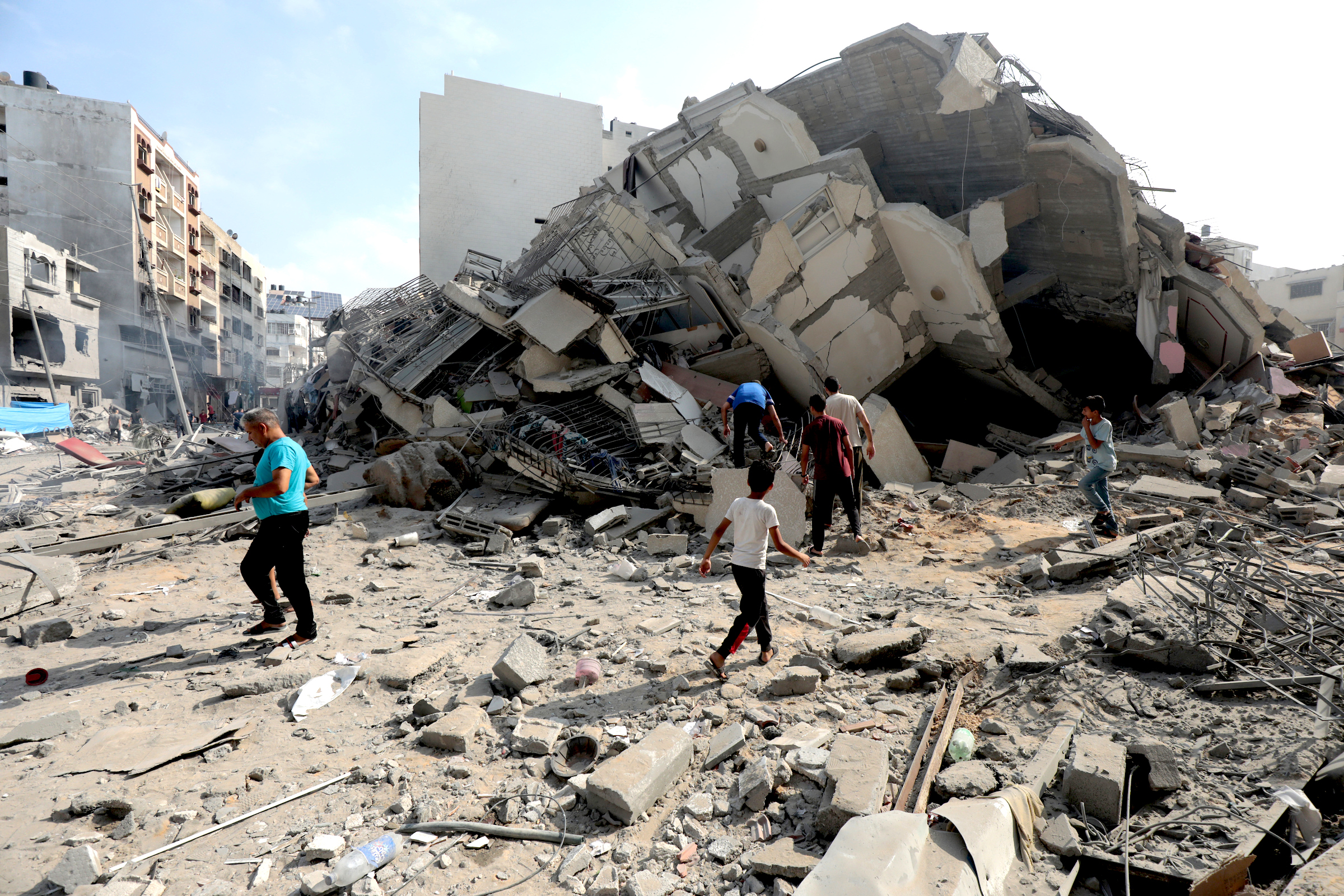Manal A. Jamal on the complex system of laws, policies and regulations that Israel has put in place to curtail rights and freedoms.

National march for the Palestinian people in London, Oct. 14, 2023. (Steve Eason, Flickr, CC BY-NC 2.0)
By Manal A. Jamal
Common Dreams
 The slogan, “From the River to the Sea, Palestine Will be Free,” has become one of the most controversial protest chants of the day.
The slogan, “From the River to the Sea, Palestine Will be Free,” has become one of the most controversial protest chants of the day.
Numerous students, activists, and political figures, including Congresswoman Rashida Tlaib, have been penalized and/or censured for merely uttering the slogan.
And yet, university leaderships and America’s political establishment have yet to seriously engage the policies that have made this slogan a rallying call for a new protest generation.
Meanwhile, in January, Prime Minister Benjamin Netanyahu’s announcement that Israel would retain full security control over the entire area west of Jordan did not as much illicit a single response from America’s political establishment.
Ultimately, no matter how we parse the protest slogan, “From the River to the Sea, Palestine Will be Free,” or which interpretation we choose, one reality remains: Between the River Jordan and the Mediterranean Sea, not a single Palestinian is free.
From Israel, to the West Bank (including East Jerusalem), to the Gaza Strip, Israel has put in place a complex system of laws, policies, and regulations that fundamentally curtail the rights and freedoms of nearly every Palestinian and Arab (approximately 7.4 million people) in this territory.
Even among its own citizens, Israel has established different tiers of citizenship, only according full citizenship to its Jewish population.
Discriminatory Laws
Currently, 67 laws discriminate against the Palestinian and Arab citizens of Israel (Adalah), including laws that authorize Jewish-only screening committees to select land and home purchase applicants based on their “social suitability,” effectively denying applicants on the basis of race, religion or ethnicity.
In 2018, the Israeli Knesset passed the Jewish-Nation State Law which reserves the right of national self-determination to its Jewish citizens only, and advocates for the development of Jewish settlement as a national value.
Effectively, the law denies the collective rights of 2.1 million Palestinian and Arab Israelis — 21 percent of its population. The underfunding of Palestinian towns in Israel and employment discrimination against Palestinians and Arabs is commonplace.
Of the 46 Bedouin villages in Israel, home to a population of 200,000 to 250,000 (some of which identify as Bedouin and not necessarily Palestinian), only 11 are legally recognized by the state.
“Unrecognized” villages are not included in state planning or government maps, receive almost no state services such as water, sewage electricity, or health and educational services, and cannot obtain building permits to accommodate natural population growth, and are under constant threat of state demolition orders.
These communities are regularly at risk of being forcibly removed from their ancestral homes.
June 2024 will mark the 57-year anniversary of Israel’s military occupation of the West Bank and Gaza Strip, and each year since 1967 has more or less marked a retrenchment of rights for Palestinians living under Israel’s military rule.
Collective punishment measures, such as arbitrary and administrative detention (arrest without charge or trial), criminalization of peaceful protest and freedom of expression, curfews, use of tear gas, house demolitions, deportations, and routine disproportionate use of force are everyday features of Israel’s military occupation.

Palestinian Youth Accord for Prisoners rally in Gaza support of Palestinian administrative detainees on a mass hunger strike, May 12, 2014. (Joe Catron, Flickr, CC BY-NC 2.0)
Although in the post-1993 Oslo era, the Palestinian Authority attained limited self-rule in the oPt, Israel has remained in control of airspace, borders, security, movement of people and goods, and registry of the population (source: Human Rights Watch).
Moreover, the legalization of nationalist symbols, such as the Palestinian flag and its colors, and more open political affiliation with the PLO was accompanied by a new crippling system of movement restrictions throughout the territory.
In 1993, Israel put in place the first permanent military checkpoint separating Jerusalem from the rest of the West Bank and imposed a general closure with checkpoints over the Gaza Strip.
As of early 2023, there were approximately 645 such movement obstacles in the West Bank, which included 77 full-time staffed checkpoints, 139 occasionally staffed checkpoints, 304 roadblocks, and 73 earth walls (source: UNOCHA).
These movement restrictions severely prevent or restrict access to services, main roads, urban centers, and agricultural areas, and have in short devastated the Palestinian economy.
More than 750,000 Jewish Israeli settlers now live in the West Bank. These settlement zones constitute approximately 40 percent of the territory to which Palestinians have no or minimal access (source: B’Tselem).
Israeli Jewish settlers have preferential treatment in every aspect of life from access to natural resources, economic privileges, freedom of movement, to guaranteed military protection and although the settlers are subject to Israel’s civil laws, Palestinians are subject to Israel’s military laws.

Kalandia checkpoint from West Bank into Jerusalem. (Joe Lauria)
After Israel’s annexation of East Jerusalem in 1980, approximately 372,000 Jerusalem Palestinians became non-citizen permanent residents of Israel. Along with permanent residency status, Israel granted them access to state health insurance and state services, and the right to vote in municipal elections, and unlike Palestinians in the rest of the oPt, they can travel freely throughout the territory.
As Israel’s non-citizen permanent residents, however, the Palestinians of Jerusalem are not allowed to vote in national Israeli elections (and more recently Israel decided that they cannot vote in Palestinian national elections as well).
The municipality routinely under serves the Palestinian areas of East Jerusalem, resulting in insufficient educational facilities and services and subpar infrastructure, and denies building permits to these communities. The movement restrictions have cut off East Jerusalem from the rest of the West Bank, severing critical organic economic ties, again devastating the economy of Arab East Jerusalem.
Jerusalem Palestinians are required to regularly prove that their “center of life,” or primary residency, is in Jerusalem. Failure to confirm continuous residency leads to the revocation of residency status. Since 1967, Israel has revoked the residency and forcibly displaced more than 14,000 Jerusalem Palestinians (source: B’Tselem).

Palestinians in the ruins of Aklouk Tower destroyed in Israeli airstrikes in Gaza City on Oct. 8, 2023. (Palestinian News & Information Agency for APAimages, Wikimedia Commons, CC BY-SA 3.0)
Israel closed off the tiny enclave that is the Gaza Strip and placed it under complete siege beginning in 2007. Since then, Israel has severely restricted the movement of goods and prevents Gaza’s residents from traveling to the West Bank or through Israel, denying most of the population critical medical treatment, and educational and professional opportunities that could only be obtained outside of the Strip.
The closure policy suffocated Gaza’s economy, leading to unemployment rates of approximately 46 percent in 2023, one of the highest in the world, and making 80 percent of the population reliant on humanitarian assistance. The 141-squared-mile enclave is best described as an open-air prison, and as I pen this article, Gaza’s captive population is being subjected to Israel’s genocidal war.
Regardless of how we choose to interpret the slogan, “From the River to the Sea, Palestine Will be Free,” this is the reality on the ground in terms of freedom for Palestinians, and this article does not even address the daily violence to which Palestinians are subjected.
Ultimately if there is any hope for a just resolution to this conflict, two questions will need to be addressed by the the political establishment in the United States: Can Israel’s allies continue denying basic human rights to Palestinians — rights that should be inherent to all human beings? And should Israel remain above international law and the laws of nations that underpin a rules-based order?
Manal A. Jamal is professor of political science at James Madison University and author of Promoting Democracy: The Force of Political Settlements in Uncertain Times.
This article is from Common Dreams.
Views expressed in this article and may or may not reflect those of Consortium News.

I say “From the River to the Sea, Palestine Will be Free!. I don’t care what genocide Joe has to say. Free Palestine! Everyone in Palestine to be Palestinians.
settler-colonialism on steroids: indigenous people at first severely restricted, and ultimately losing not only their rights but their history, their language, their soul. it’s painful, frustrating and heart-breaking that it continues to this day.
sigh—-Israel has been murdering Palestinians since NAKBA in 1948. Joe Biden supports this newest horror of Israel murdering Palestinians. Joe Biden is a man without a soul. I guess he’s not a Catholic anymore, just another dispicable murderer like Netanyahu . The United Nations certainly appears to be betraying the people of Palestine. Is only some human life valuable?
I’m not sure if Netanyahu is the new Hitler, or the awful America who also MURDERED Native Americans for their land. Hmmm, murderous America and murderous Israel have so much on common—in DEATH.
Going out on a limb, I’d say most Americans haven’t got clue that there is no difference between the protest slogan: From the river to the sea Palestine will be free” and Netanyahu’s pronounced proclamation that “Israel would retain full security control over the entire area west of Jordan”.
Are most Americans even aware that the Jordan river is the separation boundary between Jordan and Palestine/Israel.
Are they even able to locate and differentiate the lines demarcation of the Mandated division between the state of Israel and the remnant areas of ‘old’ Palestine arbitrarily and deceitfully allocated to the indigenous non Jewish population?
How does separating Americas political establishment from us ‘deplorables’, the hoi polloi population, help to resolve the issues, when most of us don’t even understand the full extent of our history’s deceptions perpetrated on us to grasp the complexities in international relations to truly see the full picture?
Truth is one thing! Getting it across so that there is a more comprehensive cognition of what is actually taking place, means a better educational system is required.
‘Indoctrucation’ is not equivalent to truth in education, as I understand the term!
This comment could have used some editing, for the sake of clarity and lucidity in describing intent.
Too hasty in thought processes to satisfactorily transcribe to written language with less than adequate typing skills to accomadate the creative rush!
However, for innocuous, respectful speech to be ‘moderated’ boils down to the issues of censorship. Any form of coercion is anti-democratic.
Isn’t this precisely what the case against Julian Assange and Wikileaks revolves around.
Criticizing government is a deep-rooted component of a free society.
Preaching to the choir…. my apologies